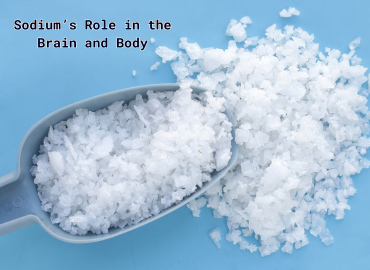Sodium’s Role in the Brain and Body
The natural form of sodium is a soft, silvery alkaline metal with the elemental symbol Na on the Periodic Table. It is highly reactive and is thus never found in its pure form in nature.
The most common way humans encounter sodium is in the form of sodium chloride (NaCI), or table salt. Table salt is an ionic compound comprised of roughly 40% sodium and 60% chloride by weight. Table salt is typically sold with additional anticaking agents like magnesium carbonate or sodium aluminosilicate to make it flow freely. Salt can be iodized by adding potassium iodide, often done to head off iodine deficiency.
The main way we get sodium is through our food. Salt is found naturally in many foods and is frequently added as a flavoring agent.
Sodium is essential for us to function properly and has many uses in the human body and brain. Some of these are:
− Sodium helps us absorb nutrients from the masticated food moving through our intestines.
− Sodium assists in maintaining the body’s balance of fluids by encouraging the entrance
of water into the bloodstream.
− Sodium is important for blood pressure regulation and healthy cell function.
− Sodium is needed to transmit vital nerve impulses and regulate muscle contractions.
− Sodium is an essential electrolyte that helps maintain the electrical balance in the human body.
− Nerves and muscle tissues need sodium to grow properly.
Too much sodium is a problem that is easy to run into due to processed foods and our natural liking for salty tastes. The recommended daily intake of sodium for adults is 2,300 mg. These are some consequences of too much sodium:
− Excessive sodium can damage blood vessels and disrupt blood flow to the brain and other vital organs.
− Too much sodium is linked to increased risk of heart disease and stroke.
− Sodium is known to have inflammatory effects on human tissue when taken in excess.
− High sodium levels are associated with elevated blood pressure.
− Inflammation from too much sodium can affect the immune system and gut flora.
− A diet high in salt can cause the buildup of a certain protein that is associated with
Alzheimer’s disease.
Not getting enough sodium is a problem too. Sodium deficiency is less common but can occur in cases of kidney failure, diarrhea, or chronic vomiting. Sodium deficiency can cause:
− Seizures
− Muscle cramps
− Confusion
Hydrating sports drinks can help to regain the balance of sodium and other electrolytes.
Watch your sodium intake by reading labels and taking care not to put too much salt on your food. Ask your doctor for tips for on a healthy diet without too much sodium, particularly if you have high blood pressure, water retention, or inflammation. Always talk with your doctor before beginning any new treatment or regimen.
The health of mind and body is our ultimate goal. For more information on our services, write
to us anytime on our website or call (585) 442-6960. We look forward to hearing from you.




